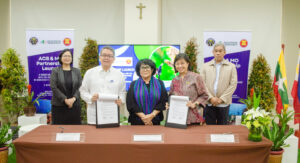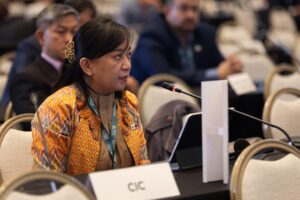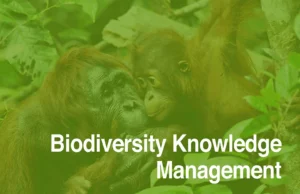Participants of the two-day inaugural Biodiversity Science Forum organised by the ACB Scientific Advisory Committee held in Bangkok, Thailand.
BANGKOK, Thailand—Renowned biodiversity experts, scientists, and science educators came together for the first-ever ASEAN Biodiversity Science Forum, the brainchild of the Scientific Advisory Committee (SAC) of the ASEAN Centre for Biodiversity (ACB). Held from 10 to 11 October 2023, the forum served as a venue for members of the scientific community to present studies that focused on species and ecosystems that can be found in forests over limestone karst and ultramafic habitats in the ASEAN region.
The resource speakers shared research findings on topics ranging from freshwater shrimps found in karst caves to research strategies for rafflesia conservation.
Limestone karsts – sedimentary rocks composed primarily of calcium carbonate and are usually seen jutting out of the sides of hills or mountains – were formed millions of years ago and are considered one of the most impressive geological features. In the ASEAN region, limestone karsts compose about 17 per cent of the total land area and can be found extensively in Indonesia, Malaysia, Myanmar, the Philippines, and Viet Nam.
On the other hand, ultramafic ecosystems are igneous or metamorphic rock formations that contain high amounts of heavy metals, specifically nickel, iron, chromite, copper, and magnesium.
Executive Director Dr. Theresa Mundita Lim of the ACB welcomed the participants during the opening programme. “We hope to use this forum as a platform to strengthen the scientific knowledge base of experts within the ASEAN region, and foster a dynamic information-exchange in the field of science, among the best minds in the ASEAN region to help guide our way towards a more informed, science-based decision-making process on how to strike the balance between conserving our rich and diverse natural wealth and the rapidly increasing rate of economic recovery and growth in the region”, she said.
Mr. Dominik Fortenbacher, GIZ Project Director of the Institutional Strengthening of the Biodiversity Sector in ASEAN (ISB II) Project thanked the host country Thailand for hosting the event. “The German government, through the GIZ, will remain a strong partner for many AMSin formulating and implementing respective policies on nature conservation and biodiversity. On behalf of the German government, we are currently implementing bilateral projects in Thailand, Philippines, Viet Nam and Indonesia together with the respective environment ministries in these countries. A lot has been achieved in these projects – however, there is still a need to do more, and we hope that we can continue our good collaboration”, he said.
Among the presenters was Dr. Lawrence Heaney, Curator of Mammals of the Field Museum of Natural History, USA, who underscored how essential forests over limestone habitats are to threatened Philippine mammals. Dr. Heaney, who began his research in the Philippines in 1981, said that the Philippines’ Sibuyan Island, which includes five endemic mammalian species, is believed to have the highest per-square-kilometer concentration of endemic animals anywhere on the planet.
Held in parallel with the science forum was a two-day workshop on National Clearing-House Mechanism which was participated in by representatives from Lao PDR, Myanmar, and Viet Nam. Presentations and demonstrations were held to familiarise participants with the Bioland tool which will enable them to develop their respective national CHMs.
The Bioland tool is an online platform developed by the Convention on Biological Diversity to facilitate the exchange of information and knowledge on biodiversity. It serves as a central repository for biodiversity-related data, scientific research, policies, and best practices.
Originally formed in 2008 as a scientific panel that reviewed proposals and project results of the ACB and to ensure the delivery of mutual benefits to the ASEAN Member States and the region, the SAC was reformed in 2019 and became a science-policy advisory body to the ACB.
























